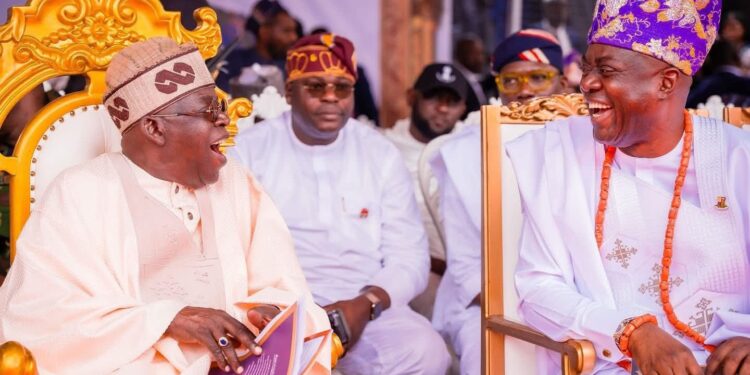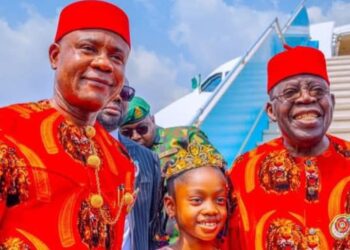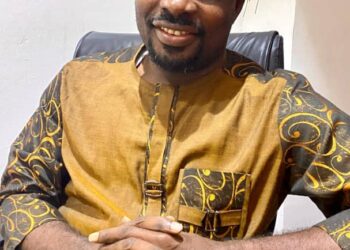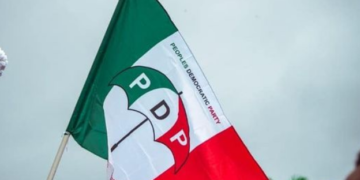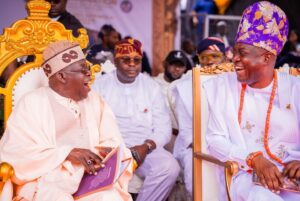
By Ibrahim Kegbegbe
As Nigeria begins to stir toward another election season, the political atmosphere is already thick with speculation. Among the names quietly gaining traction within the People’s Democratic Party (PDP) is that of Oyo State Governor, Seyi Makinde — a man whose calm disposition often belies his strategic depth. Yet, the question lingers across political corridors: is Makinde’s rumored presidential ambition for 2027 a sincere quest for national leadership, or a subtle political maneuver aligned with President Bola Ahmed Tinubu’s broader power game?
President Bola Ahmed Tinubu, Nigeria’s political grandmaster, has built a formidable structure that stretches beyond the Southwest into every geopolitical zone. His political dynasty is not merely a network — it is a living organism that feeds on loyalty, reward, and strategic patience. From Lagos to Lokoja, Kaduna to Calabar, Tinubu’s protégés sit in positions of influence, giving him a reach that few politicians can rival.
With this reality, analysts wonder if any PDP contender from the Southwest — Makinde included — can mount a credible challenge. “Tinubu’s structure is almost like a shadow government,” said Mr. Kunle Agboola, a political analyst based in Ibadan. “Anyone who wants to challenge him from the Southwest must first dismantle his influence in Lagos, Ogun, Ondo, Osun, and Oyo — that’s not an easy task. The man has spent over three decades building those roots.”
Still, Governor Makinde’s name continues to resonate within the PDP’s national structure. Having served two terms as Oyo governor with a relatively stable administration, he has carved an identity distinct from the godfather-dependent politics that dominate the region. His style — technocratic yet populist — has endeared him to the youth and middle class who crave a fresher brand of leadership.
“Makinde represents a generational shift,” noted a senior PDP National Working Committee member who spoke on condition of anonymity. “He’s not the typical Nigerian politician. He’s deliberate, soft-spoken, and more interested in problem-solving than power plays. If the PDP zones the presidency to the South, he’s one of the few with genuine national appeal.”
However, Makinde’s political independence is not without its controversies. In the 2023 presidential election, he was among the famous G5 governors — a bloc of PDP governors who refused to openly back their party’s candidate, Atiku Abubakar. His decision to stay neutral, while criticized by some as betrayal, was viewed by others as political prudence. That move reportedly earned him goodwill within the APC hierarchy, particularly among Tinubu loyalists who saw him as a “reasonable opposition.”
This, however, fuels skepticism about his 2027 ambition. “Makinde has been walking a tightrope between PDP loyalty and quiet admiration for Tinubu,” observed Dr. Lateef Odegbenle, a politicalanalyst and lectuer at the Nigerian Institute of Journalism, Lagos. “His body language doesn’t show open confrontation. Some of us believe his ambition is more strategic — to keep the Southwest politically stable for Tinubu’s second term.”
Within the PDP, such suspicions have caused mild discomfort. Some party members view Makinde’s rising influence with cautious optimism, while others fear it could dilute the party’s identity in the region. “Makinde is intelligent, no doubt,” said a Southwest PDP chieftain from Ondo State. “But we need to be sure he’s not playing both sides. The PDP must avoid another 2023 scenario where internal divisions handed APC an advantage.”
Despite these doubts, Makinde remains one of the few PDP governors with visible achievements that can serve as campaign capital. His infrastructural expansion in Ibadan, improvements in public schools, and pragmatic fiscal management have earned him praise even from across the aisle.
READ ALSO:Bullion Records Breaks Into Nigeria’s Top 3 Record Labels, Shaking Up Afrobeats Powerhouses
For many young Nigerians, Makinde symbolizes a “competent alternative” — someone who could represent a departure from the recycled political elites. “He may not have Tinubu’s machinery,” argued Taiwo Lawal, a youth political commentator from Oyo. “But Makinde has credibility among the younger generation, and that can’t be ignored. The real question is whether the PDP is ready to invest in that credibility.”
As 2027 draws nearer, the Southwest appears set for an intriguing political contest. Tinubu, the incumbent and strategist, controls the field with the confidence of a man whose roots run deep. Makinde, the emerging technocrat, stands at the edge of national relevance — either as a challenger or a quiet collaborator.
For now, his next political move will determine the narrative. Is Seyi Makinde truly ready to confront Bola Ahmed Tinubu’s empire head-on — or is his ambition a well-calculated piece in Tinubu’s grand design?
READ ALSO:Sanwo-Olu Hails Team Brazil’s Triumph at E1 Lagos GP
If Makinde’s presidential ambition is genuine, it could reshape the political landscape of the Southwest and redefine the PDP’s relevance in Nigeria’s national politics. But if it’s merely a political calculation crafted to sustain Tinubu’s dominance across party lines, then Nigerians may be witnessing another performance in the theater of political choreography — beautifully acted, but deeply predictable.


